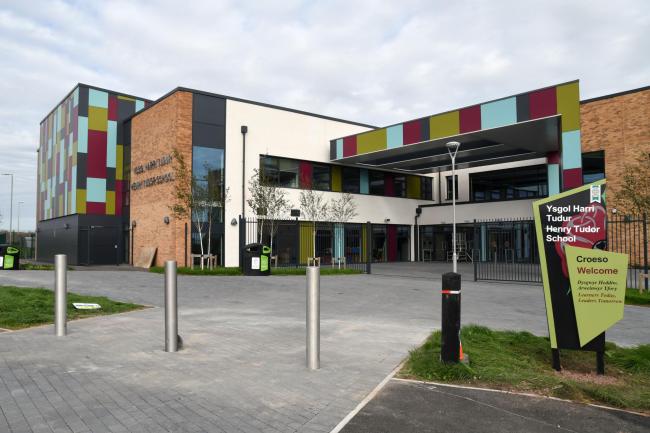A BRAND new Pembrokeshire school, which had been open for just ten weeks at the time of inspection in November 2018, is in need of serious and urgent improvement.
The £38.3m Henry Tudor School secondary school needs to raise standards, particularly in key stage 4 and the sixth form, improve pupil attendance and behaviour, and improve the quality of teaching and assessment. The school also needs to strengthen the effectiveness and accountability of the management of the school at all levels.
Estyn, the education and training inspectorate for Wales, said in its latest report: “In accordance with the Education Act 2005, HMCI is of the opinion that this school is in need of significant improvement. The school will draw up an action plan to show how it is going to address the recommendations. Estyn will monitor the school’s progress about 12 months after the publication of this report.”
The school was inspected in five areas of service provision, and under ‘standards’, ‘wellbeing and attitudes to learning’ and ‘care, support and guidance’ the school scored ‘unsatisfactory and in need of urgent improvement’. In the two areas, ‘teaching and learning experience’ and ‘leadership and management’ the school attained ‘adequate but needs improvement’
A spokesperson for the council hit back highlighting the positives in the report, saying: “Positive features from the report include the fact that Henry Tudor School provides a caring and supportive environment which has a positive impact on the majority of pupils.
“Most pupils behave well around the school, enjoy their lessons and are positive about learning. They work independently, engage well in activities, make useful contributions in class and at least suitable progress in lessons. Provision for pupils with additional learning needs is comprehensive and well organised and overall, they make suitable progress over time.
“The report says many pupils feel the school listens to their views and makes changes as a result, and most teachers have secure subject knowledge and many foster productive working relationships with their pupils.
“Many teachers provide good language models, communicate clearly, and establish effective routines to ensure pupils settle quickly and are ready to learn.
“At key stage 4, school leaders plan the curriculum effectively to meet pupils’ educational needs and aspirations, and the school provides a wide range of valuable opportunities to enhance the curriculum.
“Others positives include daily mentor sessions, which are described as beneficial, and the fact that many teachers and school staff engage purposefully with professional learning opportunities. The appointment of the new Head teacher was a ‘catalyst for change’ and there is a clear vision of high expectations for standards and behaviour.
“The report also includes a summary of areas to significantly and rapidly improve. It says there has been a sharp downward trend in the school’s performance at key stage 4 over the past four years, that a minority of pupils do not concentrate well in lessons and the behaviour of a few pupils causes significant disruption in lessons and has a negative impact on other pupils’ progress.
The report adds that a minority of pupils do not feel safe in school, and a few say that they experience bullying. Attendance does not compare well to that in similar schools.
It also says that in the majority of cases, teachers do not plan lessons sufficiently well to enable pupils to make strong progress and in general, the quality of teachers’ written feedback to pupils is too variable.
Other areas to improve include self-evaluation and improvement planning work and the professional learning support for middle leaders.
Mrs Fiona Kite, Headteacher of Henry Tudor School since September 2017, said governors and staff are working hard to address the recommendations in the report, and to ensure that the school is rated at least good by Estyn in the future.
“We look forward to welcoming them back for a monitoring visit in 12 to 18 months’ time, and to show them the impact of the range of new initiatives which have already been implemented at the school,” said Mrs Kite.
“We are very proud of our pupils and all of their many academic, creative and sporting achievements.”
A worrying paragraph in the report states: “A minority of pupils do not concentrate well in lessons and do not contribute to class discussions.
“The behaviour of a few pupils causes significant disruption in lessons and impacts negatively on other pupils’ progress.
“A very few pupils are disrespectful and defiant towards staff and do not show appropriate respect and care for others. A minority of pupils do not feel safe in school and a very few pupils reported that aggressive behaviour by a few pupils is common during break times. A few pupils say that they experience bullying and a minority feel that the school does not deal effectively with this.
“The rates of both fixed term and permanent exclusion are too high. Although attendance has improved marginally over the last three years, it remains significantly below that in similar schools. However, rates of persistent absence have declined during the last two years. “

















